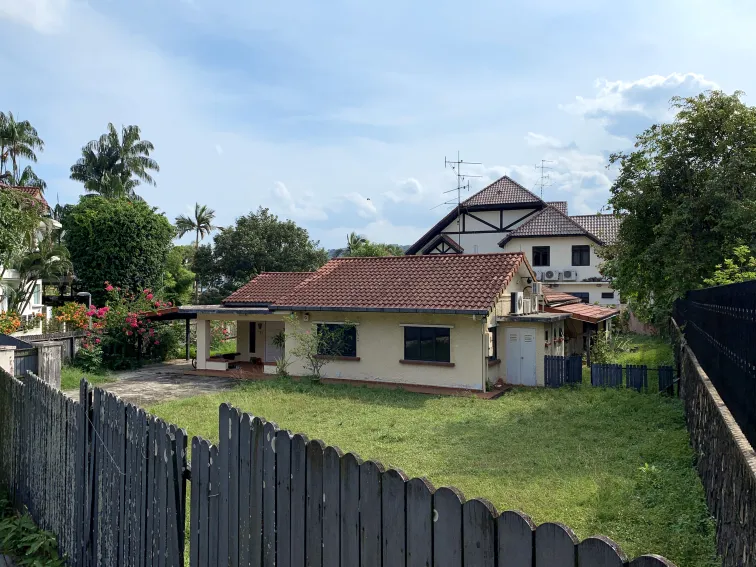
Daily Briefing: Peacocks put damper on Sentosa's automated bus trials; Chestnut Crescent GCB for sale at $9m
And here’s how Singapore copes with the effect of an ageing population on its workforce.
From Reuters:
Roaming peacocks, meandering tourists and curbside bushes were all causing headaches this week for operators of one of the first autonomous bus shuttle services to hit public roads in Singapore.
Singapore, ranked second behind the United States in its preparedness for wide-scale driverless transport in a recent KPMG report, plans to deploy autonomous buses in three districts of the island from 2022.
The latest trial, due to run until November 15, is being closely watched by tech firms and automakers around the world following a series of mishaps.
On the first day of the trial on Monday, roadside bushes lightly buffetted by the wind and wandering beachgoers were enough to trigger the bus’ many sensors, bringing it to a juddering halt as it trundled along quiet roads.
Tan said the most “dangerous beasties” encountered so far were roaming peacocks which fly unexpectedly into the road.
Read more here.
From PropertyGuru:
A good class bungalow (GCB) at 7 Chestnut Crescent will be put up for sale via auction next month, with the owner asking $9m for the property or $975 per sq ft (psf) based on the total land area of 9,232.2 sq ft, revealed Colliers International.
The psf pricing compares favourably to a landed house at 29 Chestnut Crescent which was sold for $8.8m or $1,103 psf in Q3 2018.
The freehold property is situated within the GCB area in Bukit Panjang. Notably, there are only 39 clusters within the city state that have been gazetted for GCBs.
Read more here.
From CNBC:
Singapore’s workforce is grappling with the twin challenges of an ageing population and job losses due to technology.
According to a report on the burden of disease in Singapore between 1990 and 2017, the island state surpassed Japan in 2017 to become the country with the longest life expectancy at birth — at nearly 85 years old.
Longer life expectancy, coupled with a low fertility rate, has increased the proportion of older people in the country. As a result, the city state’s workforce is rapidly shrinking, creating pressure on the economy.
According to Singapore’s Education Minister Ong Ye Kung, the government has been preparing for an ageing workforce “for the past 20 years.”
Singapore is in the midst of “reforming the education system for the young,” Ong told CNBC’s “Squawk Box Asia” on Tuesday. He pointed out, however, that the challenge was really in helping older workers, as younger employees are “very adaptive.”
Read more here.


![SBR 5 Lorem Ipsum News 2 [8 May]](https://cmg-qa.s3.ap-southeast-1.amazonaws.com/s3fs-public/styles/exclusive_featured_article/public/2025-05/a_hand_pointing_to_a_futuristic_technology_5b87c9d0e3_3.png.webp?itok=M3Hf-9XR)
![SBR 4 Lorem Ipsum [8 May Top Stories]](https://cmg-qa.s3.ap-southeast-1.amazonaws.com/s3fs-public/styles/exclusive_featured_article/public/2025-05/a_hand_pointing_to_a_futuristic_technology_5b87c9d0e3_2.png.webp?itok=2m5Wl0MX)


![Exclusive three SBR 12 Lorem Ipsum [8 May]](https://cmg-qa.s3.ap-southeast-1.amazonaws.com/s3fs-public/styles/exclusive_featured_article/public/2025-05/a_hand_pointing_to_a_futuristic_technology_5b87c9d0e3_11.png.webp?itok=8kn_UIfA)
![SBR 3 Lorem Ipsum [ Exclusive 2]](https://cmg-qa.s3.ap-southeast-1.amazonaws.com/s3fs-public/styles/exclusive_featured_article/public/2025-05/a_hand_pointing_to_a_futuristic_technology_5b87c9d0e3_1.png.webp?itok=YCyjLegJ)
![SBR 2 Lorem Ipsum [8 May]](https://cmg-qa.s3.ap-southeast-1.amazonaws.com/s3fs-public/styles/exclusive_featured_article/public/2025-05/a_hand_pointing_to_a_futuristic_technology_5b87c9d0e3_0.png.webp?itok=_cKD-29o)

![Video [Event News]](https://cmg-qa.s3.ap-southeast-1.amazonaws.com/s3fs-public/styles/event_news_featured_article/public/2025-05/screenshot-2025-05-08-at-4.58.53-pm_0.png.webp?itok=Kud35sMs)
![Event News SBR 9 Lorem Ipsum [8 may]](https://cmg-qa.s3.ap-southeast-1.amazonaws.com/s3fs-public/styles/event_news_thumbnail/public/2025-05/a_hand_pointing_to_a_futuristic_technology_5b87c9d0e3_8.png.webp?itok=DTh_dbYp)
![Event News SBR 9 Lorem Ipsum [8 May]](https://cmg-qa.s3.ap-southeast-1.amazonaws.com/s3fs-public/styles/event_news_thumbnail/public/2025-05/a_hand_pointing_to_a_futuristic_technology_5b87c9d0e3_7.png.webp?itok=vzDAzb6V)
![Event News SBR 8 Lorem Ipsum [8 May]](https://cmg-qa.s3.ap-southeast-1.amazonaws.com/s3fs-public/styles/event_news_thumbnail/public/2025-05/a_hand_pointing_to_a_futuristic_technology_5b87c9d0e3_6.png.webp?itok=jvHFc4P6)
![Video [Event News]](https://cmg-qa.s3.ap-southeast-1.amazonaws.com/s3fs-public/styles/video_thumbnail/public/2025-05/screenshot-2025-05-08-at-4.58.53-pm_0.png.webp?itok=yZnI0YBb)
![Video 1 SBR [8 May]](https://cmg-qa.s3.ap-southeast-1.amazonaws.com/s3fs-public/styles/video_thumbnail/public/2025-05/screenshot-2025-05-08-at-4.58.53-pm.png.webp?itok=9AAeRz_k)

 Advertise
Advertise

